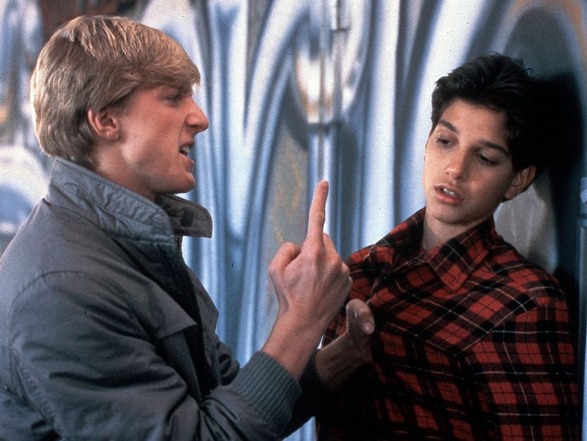
On a cold September afternoon, Jr. Bella VanDerVeen was sitting on her charcoal grey couch after school, when her heart sank. Watching Young Sheldon, she grew frustrated at the negative Christian portrayal she’s noticed frequently in modern-day television. VanDerVeen said, “In Young Sheldon, there were strong church views when Georgie got his girlfriend pregnant and it was crazy how fast the church turned against them and judged them”-“while that may be true with some churches, we’ve seen Christians and churches come around, and surround young parents and single moms.” Churches unlike their representation, are not quick to turn from those who have sinned, because truthfully we all have sinned and fallen short. Churches are instead slow to anger and quick to love, providing help and guidance as they are able.
Television is a part of the daily schedule for Americans”, “whether to relax, spend time with friends and family, or distract oneself. According to Forbes, the average American watches around three hours of television daily. Because the television many Americans watch includes Christian bigotry, not only do Americans retain these ideals, but they could begin holding similar principles themselves.
Southpark is a prime example. In Season 6, Episode 8, a secondary character said, “Now come on everybody, just because a few priests in the country have been corrupt doesn’t mean all priests are child molesters.” Yes, Southpark is a comedy series, but at what point does comedy cross the line? Do secernate values allow for the mockery of Christianity, openly disrespecting a religion 68% of US citizens value, according to Gallup. What defines and defies the limit to which screenwriters can go to be comedic yet respectful, and does such a line exist.
Pastor Aaron VanDerVeen said, “As a Christian, I actually believe that laughter is a gift of God, and God’s grace and love in Jesus gives us the ability to laugh at ourselves and just the silly things in life…However, laughter and comedy at the “expense” of another, a group, and so on crosses the line to me. If we are intentionally hurtful, demeaning, or even stereotyping to prop ourselves up, advance our agenda and take others down, the line has been crossed for me…” To cross or not cross the line is not up to viewers, although control over what one chooses to watch is.
In Family Guy, Brian said, “You shut your heathen mouth or I’ll smack you”
“Brian that’s pretty Christian of you,” Stewie said, pegging Brian as the stereotypical Christian extremist who goes to great lengths to correct and push their beliefs onto others. Unfortunately, some Christians misrepresent God’s calling to love others, to “Be completely humble and gentle, be patient, bearing with one another in love” (Ephesians 1:20).
If someone has misrepresented Jesus in the way they live out their faith, know the common stereotype is not true of all Christians. While the job of a Christian is to spread the love of God, the goal is to apprise, not force Christianity. As Pastor VanDerVeen said, “ Our human nature tends to cause us to discard the whole of something when we have experienced one person or one situation that was bad, hurtful, or challenging.”
Humans tend to take one experience and use that experience to influence everything else by disregarding something once a negative correlation has been made. Should one have a negative encounter with Christianity, all future connections could be skewed, adding to the importance of creating positive encounters opposite from what has taken prevalence on television screens. Additionally, a background character in Family Guy states “I don’t know man Jesus Hitler Christ sounds weird” to which another replied, “So just go with H,” an example for which the profanity needs no explanation.
In Young Sheldon, the show conveys Christians needing to please God with actions, seeking approval over a relationship. Pastor Vanderveen described Young Sheldons’ portrayal as such,“… Another example would be in “Young Sheldon” the constant disconnects between life and faith, the opposition of “sacred” vs. “secular”, and the stereotype of Christianity being about rules and practices to basically make God happy with you.
Again, these actually do depict some people’s experiences of Christianity or Christians, but they certainly are not what I understand being a Jesus follower is as a person and pastor.” To be considered secular is to denote something lacking a spiritual basis. Secular vs. Sacred delves deeper into the daily choice, to connect or not connect with God through everyday actions. How one chooses to portray Christ, and the effect the portrayal has on those unfamiliar with Christianity.
For one who has never witnessed a Christian beyond the negative portrayal on television, the stereotypical Christian is all they would ever observe of Christianity. Pastor Vanderveen said, “I believe that these portrayals can certainly affect people’s understanding of Christianity and what it means to follow Jesus…there are more people today who have little to no first-hand experience with Christianity due to its decline in America. This means that they only know what they know or have seen… we tend to blur the lines between entertainment and what is actually true. And, even if we know something is fiction, it is still a picture we have in our minds, and will have to work through when we encounter the real thing.”
Should adults allow shows negatively stereotyping Christianity to be watched by a younger audience? Shows such as SouthPark, and Family Guy negatively portray Christianity and are stereotyping Christians worldwide. To Christians and non-Christians alike, negative portrayal raises frustration. Why can’t religions like Christianity be portrayed positively? To attain reform, society has to speak out against the imprudence of the screenwriters writing these scripts. Given that standing up to these popular shows is unlikely, viewers should know the true Christian, not the one portrayed on their television screen.






